- Home
- Chris Wraight
The Lords of Silence Page 9
The Lords of Silence Read online
Page 9
But that doesn’t matter. A planet can be driven like this for thousands of years before it eventually keels over and becomes a death world. The quality of the crops gets steadily worse, but the quantity can be sustained almost indefinitely, assuming that supply lines are maintained and imports remain consistent. At the end of every season, the great harvester leviathans are stoked up and dragged from their pens and let loose on the grey fields, smokestacks belching and tracked undercarriages sinking deep. These massive creatures of high-sided metal and intricate pipework, the smallest of which are a hundred metres long, crawl across the blasted prairies, sucking up every last speck of pallid grain and piping it directly to antiseptic internal hoppers. Feed-landers come down from high flight, dock with the still-trundling leviathans and extract the raw material, from where it is taken into the city-sized processor vats, blasted with antibiotics, smashed, burned, crushed, then stamped and packaged. Once ready for transport, containers are dragged up into orbit aboard swell-bellied landers, ready for transfer to the void-bound mass conveyers, which deliver the refined product to every starving hive world and forge world in their long circuits.
There is a quaint tradition in the various propaganda departmentos of the Administratum of marketing agri worlds as quasi-paradises, free of the squalor and overcrowding of a standard urban station, and full of bucolic ease. Vid-cards are dropped into communal hab-warrens, extolling the virtues of a life lived outdoors with the sun on your back and a ruddy-faced boy or girl – subject to preference – by your side. In reality, life on an agri world is as unrelenting, back-breaking and monotonous as the vast majority of other Imperial vocations. There are no trees laden with glossy fruit, only kilometre after kilometre of hissing corn. There are no gentle strolls under the warming sun, only punishing work details in rad-suits, leaning into the dust-laden winds that howl around the equator with nothing to halt their rampage. Once the new arrivals have made planetfall and found this out, it is too late. Crew transports arrive on agri worlds full and leave empty. There is a saying among the indentured workers – you come for the soil, you end up part of it.
Najan is no different. Its bulk is taken up exclusively with seven approved strains of nutrient-enriched grains, overseen by the central command station midway up the northern hemisphere. Three million servitors work the Resource, the hyperfields, while little more than two hundred thousand people – less than the complement of a single spire on a mid-range hive world – control the stock of semi-automated vehicles and monitor the lattice of weather-control nodes. There are three garrisons housing a few hundred under-trained sub-Militarum-grade troopers, an astropath tower, a rudimentary orbital defence grid, a Navy station and a few other dusty offices for the various divisions of the Administratum, rarely manned. Najan’s quotas are unremarkable, its operations firmly within the expectations of the subsector command. Keeping it that way is hard work, but it is better to keep your head down than invite a visit from the off-world Scrutias Signa Quantitatis, who make Windib look like the soul of levity and carry splinter rifles.
Battacharya reflects bitterly on that as Machard’s crawler shakes and sways across the short piece of open ground between the command station and Dantine’s primary garrison building. The viewscreens are, as ever, smeared from the endless wind. She is hot, her work-habit stained at the armpits and collar. These places are not intended to be properly defensible. Their survival is predicated on rapid response from the system’s Naval assets, who prowl the void incessantly. All she has ever been required to do is to keep the astropaths happy, maintain a skeleton defence crew to buy a little time if ever required and keep the comms stations manned. In Najan’s two thousand years of uninterrupted activity, the worst that has taken place is a xenos raid, some five hundred years ago. That is legend now, a piece of old news they can laugh about in the canteens.
‘We’re due a Naval visit,’ says Machard, bouncing on the high driver’s seat as the crawler lurches along. ‘They might be able to explain all this.’
Battacharya smiles bitterly. ‘I don’t think there’ll be a visit.’
‘There’s one due.’
‘They’re not coming, Olav. I don’t know if there even is a Navy anymore, at least in this subsector.’
Machard glances at her, alarmed.
‘Throne, though – I don’t know, do I?’ She remembers what she saw in the astropath’s tower. ‘Get us there quick.’
She looks back, to where the lights of the command complex are blinking through the dust and wind. It all looks solid enough – a scatter of low-rise hab compounds set about the scaffolds of the main comm-tower. The big dropsites are back east, the hangars for the crawlers a few hundred metres away beyond the wind wall. Everything is chipped and blasted, lost in a permanent fog of rad-glow and storm clutter.
She turns back. The crawler’s arclights flash across a sloped Militarum-grade blast wall and a toothed compound gate. Flood lumens have been hoisted up to the parapet level, and for the first time ever she catches sight of troops in environment suits patrolling up there.
‘See that?’ Machard says, nudging the crawler inside as the gates cantilever open.
She says nothing. She is beginning to feel more than a little sick.
The crawler makes its way to the far side of the compound before shuddering to a halt. Both of them put masks on and tighten their collars, then the doors push open. The cab immediately fills with flying chaff, and they battle their way down to ground level.
Dantine is waiting for them, flanked by a few of his staff officers, all wrapped up in layers of environment swaddling. Dantine comes up to Battacharya and salutes.
‘Tried to get you on the comm!’ he shouts over the wind’s howl.
‘All down!’ Battacharya shouts back. ‘Can we get inside?’
‘Agreed! There’s something you should see!’
‘Am I going to like it?’
Dantine doesn’t look like he’s smiling.
‘Just come inside, administrator!’ he shouts grimly.
Captain Dantine is a better man than he has any right be. Battacharya does not know the full story, but he must have fallen foul of someone in authority somewhere, and if there were any justice he’d be serving in an Astra Militarum regiment with decent troops under his command. It is unclear how he has ended up on Najan. It seems unlikely he volunteered for the posting.
For all that, he has taken to the tasking well. His predecessor was a drunk and a brute, killed in a brawl involving several dozen of his own men. Since Dantine came to replace him, things have calmed down in the barracks. Amasec flows a little less freely, and the uniforms are put on straight.
Dantine does not normally order patrols on the battlements. Spending more than an hour or so in the open risks eroding the limited amount of good equipment they possess, so, like most of Najan’s human population, the soldiers are mostly kept confined to quarters or drilled in covered yards.
Dantine takes them down into the garrison’s lower levels. As they walk, Battacharya hears sounds of further activity taking place within the base – clunks and thuds of heavy equipment being moved. Machard looks uneasy – he finds military types unnerving, despite his physical bulk.
They enter a green-walled conference chamber, hashly lit by strip lumens. Four men are seated, but get to their feet as the captain enters. They are in standard fatigues – olive green, with flak jackets over a chainmesh weave.
Dantine gestures for them all to sit down again.
‘How’s it going up at the complex?’ he asks, drawing up a chair and rubbing the grit out of his short-cropped hair.
‘We’re going to have a problem soon,’ says Battacharya. ‘The workers know something major’s happened, just not what. We’re not much better off ourselves.’
‘There’s a Naval visit due,’ offers Machard, sticking to his line.
‘I’d have transmitted
this earlier,’ says Dantine, reaching for a capsule held by one of his men. ‘Like everyone else, we’ve been having problems with our kit, and now the main-site comm-units are down.’
Battacharya knows what he’s holding. It’s a message capsule, a secure facsimile of a military trans-burst. ‘You’d better tell me what you know,’ she says.
Dantine holds up the capsule. ‘Sent six days ago, in-system, from a Naval corvette. Decoded finally last night. It’s the one and only communication we got from it, and it wasn’t meant for us – it was a full-spectrum broadcast aimed at other vessels in the squadron. The contents were relayed from another ship operating a long way out, and after that the alpha material bears astropathic markers, so this order came in from a distance. We estimate the original was instantiated more than two standard months ago, but that’s only a guess.’
The captain speaks fast, but without hurrying. Battacharya thinks he looks tired, though, and wonders if she looks any better.
‘There won’t be any Naval visit, magister,’ Dantine says, looking briefly at Machard. ‘This is a general order to muster, pulling all assets out of the subsector. Somewhere out there, there’s a big battlegroup sucking up all our local units and heading off into the great beyond. They mention Cadia, and they talk about it in the past tense. Past tense.’
Battacharya lets that sink in. Probably just a mistake in transmission. ‘So there’s an action planned,’ she says.
‘Maybe. But here’s the thing – they were going in cold. This whisper about the Astronomican, it’s not just void chatter. They were crawling through the warp, feeling their way like they were in blindfolds. Never heard them quite so scared about it.’
She still doesn’t believe that. The Astronomican is just a part of the universe, like starlight or gravity. It can’t be gone. ‘We’ve got a lot of service ships out there still,’ she says. ‘And no news of the conveyers.’
‘They’ll all be dead-calmed,’ says Dantine. ‘Tell them, Vrede.’
He invites one of his men to speak, a red-eyed, preternaturally aged wretch with a Sanctioned Psyker medallion hanging from a scrawny neck.
‘You’ve seen the lights in the sky,’ Vrede says, and his voice trembles from weakness. He can hardly keep his hands still – it looks like he might expire any second. ‘It’s not what you think it is. Something’s broken. It shouldn’t look like that.’
Battacharya is very tired. She’s getting impatient. ‘Tell it plainly, man,’ she snaps.
‘The warp, administrator,’ says Vrede. ‘Like a local rift effect, but I can’t see the end of it. We’re on the other side of something, and I can feel it hanging over us. It’s like… a stormcloud, ready to burst.’
‘Nonsense,’ says Machard.
‘What are the effects?’ asks Battacharya.
‘I don’t know.’ Vrede looks miserable. ‘But I can’t sleep. It’s been a week now. You must have felt it too, surely?’
She has. All of them have. That’s what’s making them scratchy, unable to focus.
She sits forward, locking her fingers together. ‘We’re jumping at shadows,’ she says calmly. ‘There’s been equipment failure. Some loose talk on the voxes. We need to keep it together.’ She swallows. ‘There are so few of us, but the job’s important. We supply a lot of worlds. I want recommendations.’
Machard doesn’t have any, and he looks at his hands. Vrede remains haunted, blinking too often.
Dantine speaks. ‘We’ve been transmitting standard distress calls on Militarum channels. But here’s the truth – no one’s coming to help us, not if there’s a bigger target to defend. So I say we pull the shutters down. Disable the servitors, secure the leviathans and get my men stationed at all the complex gates. Get your workers armed too – we’ve got the equipment. Some of it’s still in the issue crates.’
That will prompt panic, at least at first. The bulk of Battacharya’s staff wouldn’t know which way round to hold a lasgun. But he’s right. She knows he is.
‘If it comes to it,’ she says slowly. ‘If something very bad’s going down, there’s one more thing.’
Machard knows what she means. ‘No,’ he says flatly.
‘If we need to,’ she replies firmly. ‘I was told this when I took the assignment. Protect, if you can. Destroy, if you can’t. Nothing for the enemy.’
Dantine smiles wryly. ‘We’re not there yet, I hope.’
Just as he finishes speaking, there’s a hurried rap on the door. A trooper bursts in.
‘The complex, sir,’ he says, looking worried. ‘Something’s happening.’
Battacharya feels a little bit sicker. Vrede has started to dribble. There is an air of desperation in the room far out of proportion to the evident danger. She finds herself wanting to scream.
‘Sure about that, captain?’ Battacharya asks, getting up. ‘I think you’d better show us where the armoury is.’
Chapter Seven
Dragan comes down in the Moranon, one of Solace’s nine Thunderhawk gunships. It’s a charcoal-black brute, its blunt outline made bulbous and dripping, its surly and decrepit machine-spirit gibbering through the internal vox like a trapped animal. Its huge turbines strain against the planet’s desiccating winds on the way down, and it sways and lists in the turbulence.
Dragan rides it out. He never enjoys the descent. If he were one of Angron’s blood-drunk slashers he’d be whooping now, whipping an already-stained blade around in practice for the carnage to come. Dragan is of the Legion, though. He likes his feet on the ground, planted firmly so he can get a considered swing at his enemy.
In the combat-lit crew bay, the rest of them are the same. There’s no sound from any of them – Garstag, his Kardainn Terminators, a couple of slack-jawed gun servitors. The interior judders and slams, the engines thunder, but they keep their mouths closed.
It’s odd, how a Legion works. Many of the Lords of Silence are Barbarans, taken from the gene pool of that mist-wreathed hell planet. A slim majority, though, are not. Most of the non-Barbarans were created in the Eye from stolen gene-seed, implanted by the Surgeons into screaming infants wrenched from feral Imperial planets, and thus have no connection with the forgotten home world. Others, like Dragan, are turncoats and renegades, refugees from distant Imperial Chapters and warbands. Somehow, though, over time, they all adopt the taciturn habits of Mortarion’s own. They stop issuing war cries. They slow down. They let their armour grow thicker, their organs merge, their skin creeps upwards into the filigree of their equipment interfaces. Joining the Death Guard is like sinking into a deep, cold ocean – the substance of it seeps inside, sooner or later, down into every crack and orifice, and you lose the things that once made you what you were.
At least, that is his destiny. For Dragan, the process is not yet complete. He still has his skin. He still has three lungs. He can remove his helm, if he wishes, and his tongue is not yet the length of a man’s arm. He can feel the rot within, chewing at his bones, making the old tattoos on his chest itch, but it has not yet become endemic. He considers Vorx, whose mind has become soft, and he looks at Slert, or even Naum, and a part of him still shudders and wishes to put off those things a little longer.
He has forgotten where he came from, though. He has no memory of his previous life, only that he was once a servant of the Imperium within a Loyalist Chapter. The others use that knowledge, if they wish to taunt him, for they know that no one hates the Corpse-spawn more than him.
You hate what you were, he understands. There is no greater zealot than the convert, he knows. And yet he has no true faith, not like Vorx or Philemon, just a desire to exert strength, to use the Gifts he has been given, to become greater.
It is not about the faith, for Dragan. It is about vengeance for a life he cannot remember. It is about dominance over a species he has cut all ties with. It is about pride, amid a Legion that barely understands the noti
on.
He wonders, sometimes, if he picked the right set of traitors.
The Moranon booms into its landing cycle, and greasy warning lumens snap on. Dragan hears the retros surge out, and the direction of momentum shifts. He reaches for a chain loop to steady himself, and the Thunderhawk slams down heavily into the dust of another world.
Garstag growls like an animal. The Kardainn-master is brutally huge within that confined space, hunched like a coiled dragon in a cave, puffing out condensation from his many helm vents. His warriors grind into action as the ramp creaks open, stomping into a hurricane of dust and organics. Dragan is last out, keeping his talons closed up for now, letting the wind snatch at his bulk, evaporating the gritty surface moisture built up in Solace’s humid interior.
They have come down in a dustbowl. They are surrounded by nondescript Imperial habs, built to a ruthlessly unimaginative template and shared with every defence station across the galaxy. Lights are blinking in the storm, faint and underpowered. This will be poor killing, he knows already.
He crunches his way towards an access hatch. Garstag heads towards another. They break them open with their gauntlets, tearing through the reinforced steel bolts and heaving the plates out. Then Dragan is inside, ducking down low and pushing along a narrow, sectioned corridor. Dust comes in with him, whipping around his knees and piling up against the prefab plasteel wall panels.
He sees the inhabitants, and they spy him. They take one look at him, disbelieving for a moment, and then they run. He lumbers after them, breathing heavily, cracking the floor with cloven treads. He hears screams from a long way off and guesses that’s Garstag’s work. More gunships are coming down, four or five of them, and that will be more than enough.

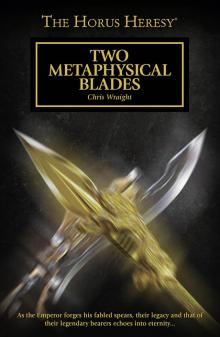 Two Metaphysical Blades
Two Metaphysical Blades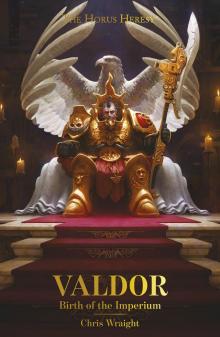 Valdor: Birth of the Imperium
Valdor: Birth of the Imperium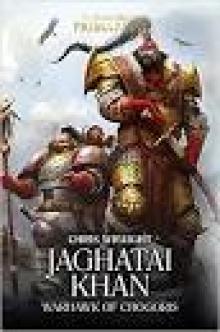 JAGHATAI KHAN WARHAWK OF CHOGORIS
JAGHATAI KHAN WARHAWK OF CHOGORIS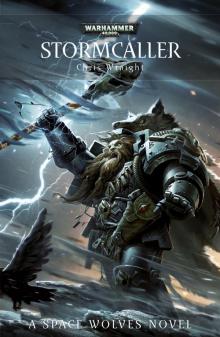 Stormcaller
Stormcaller Child of Chaos
Child of Chaos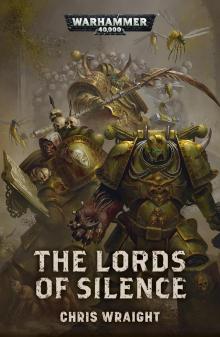 The Lords of Silence
The Lords of Silence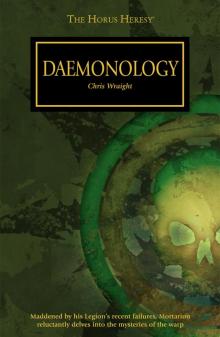 Daemonology
Daemonology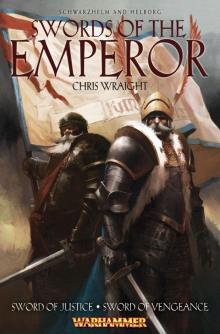 Swords of the Emperor
Swords of the Emperor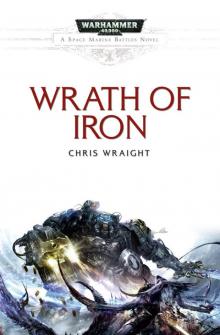 Wrath of Iron
Wrath of Iron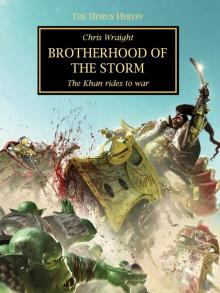 Brothers of the Storm
Brothers of the Storm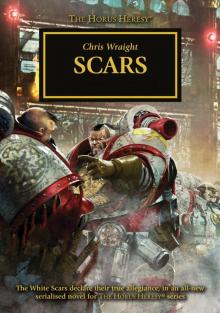 Horus Heresy: Scars
Horus Heresy: Scars The Sigillite
The Sigillite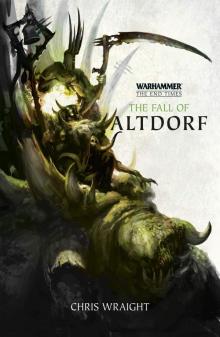 The End Times | The Fall of Altdorf
The End Times | The Fall of Altdorf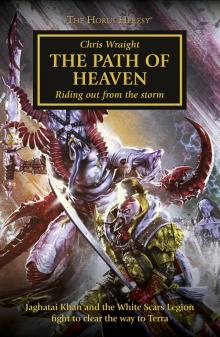 The Path of Heaven
The Path of Heaven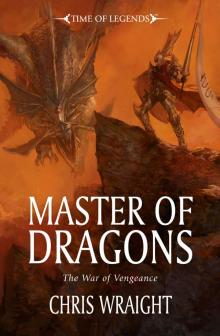 Master of Dragons
Master of Dragons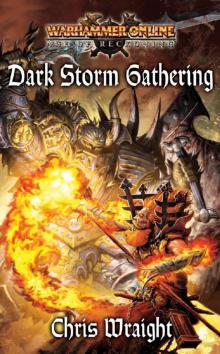 WH-Warhammer Online-Age of Reckoning 02(R)-Dark Storm Gathering
WH-Warhammer Online-Age of Reckoning 02(R)-Dark Storm Gathering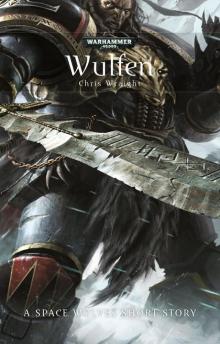 Wulfen
Wulfen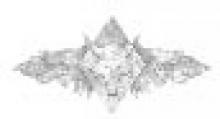 Battle Of The Fang
Battle Of The Fang Onyx
Onyx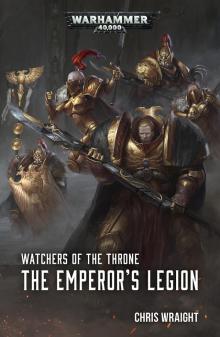 Watchers of the Throne: The Emperor’s Legion
Watchers of the Throne: The Emperor’s Legion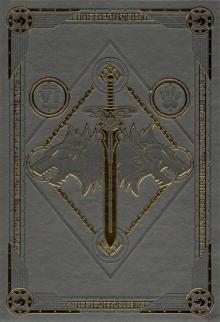 Leman Russ: The Great Wolf
Leman Russ: The Great Wolf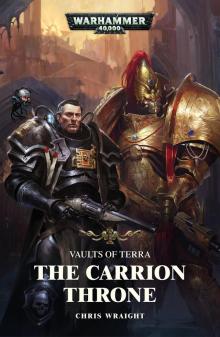 Vaults of Terra: The Carrion Throne
Vaults of Terra: The Carrion Throne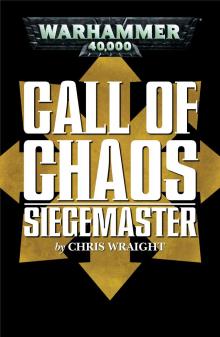 Siegemaster
Siegemaster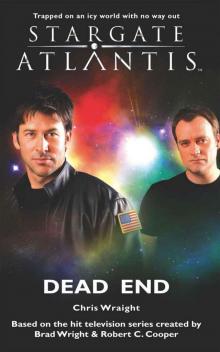 STARGATE ATLANTIS: Dead End
STARGATE ATLANTIS: Dead End Scars
Scars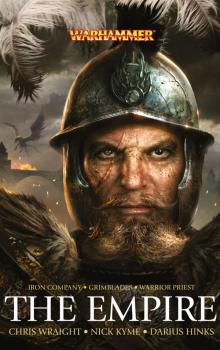 The Empire Omnibus
The Empire Omnibus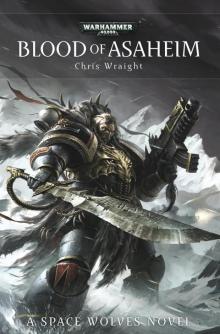 Blood of Asaheim
Blood of Asaheim